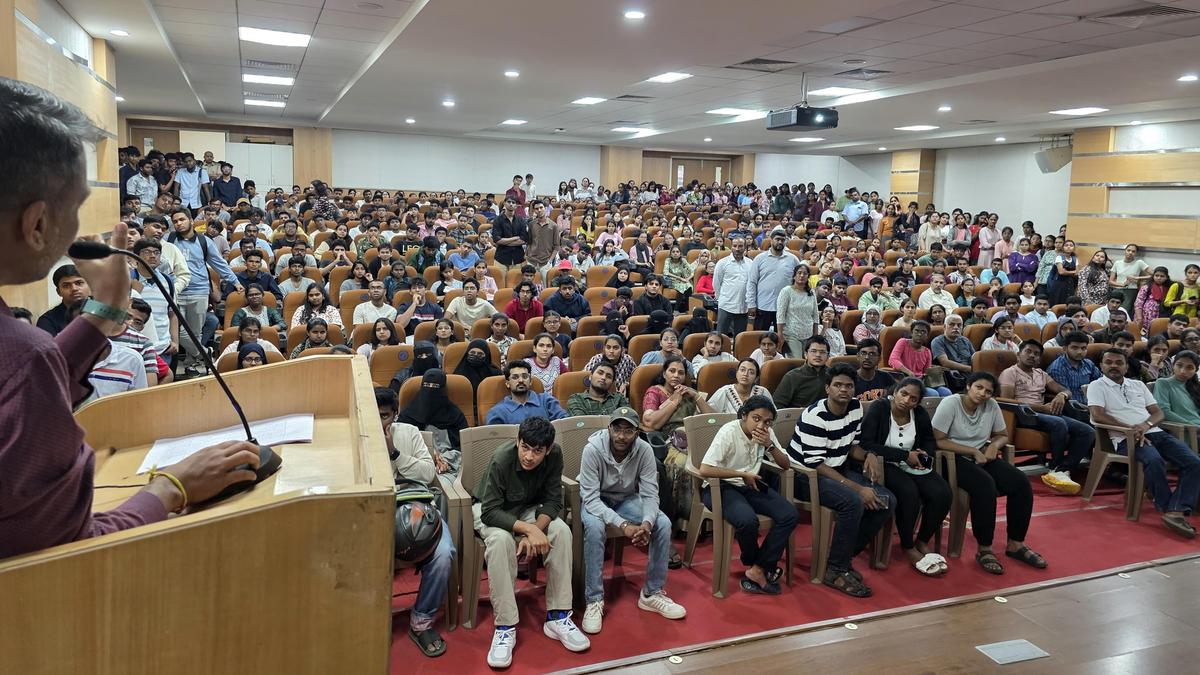Copyright thehindu

“It has been a month since the Common Entrance Test (CET-2025) counselling for admission to engineering courses for 2025-26 concluded. But, of the 150 seats available in the Computer Science Engineering (CSE) branch in our college, 40 seats are still vacant. Even though the fee for these seats is the same as the government quota seat, no student is coming forward,” lamented the head of a private engineering college in a tier-3 city in the Kalyana Karnataka region. The principal of a government engineering college in a district neighbouring Bengaluru said, “Even though the government has reduced fees for civil, mechanical and other traditional engineering courses this time, the seats are still vacant.” In contrast, thousands of engineering seats have been filled in private universities in most of the tier-1 and tier-2 cities of Karnataka, and these institutions have also taken steps to fill additional seats. This has given rise to allegations that “discriminatory policies” being applied by the State government to private universities and government, aided and private engineering colleges are the reason for the huge gap in the filling of engineering seats. Sources allege that the government is allowing private universities to start new courses and enhance the number of seats in existing courses without any obstacles and they have also been given relaxation from obtaining All India Council for Technical Education (AICTE) permission. AICTE permission is mandatory for government, aided and private engineering colleges to start new courses and enhancement of seats. As a result, private universities have taken steps to fill their seats quickly without waiting for the government’s permission every year, resulting in most students enrolling in private universities. Meanwhile, government, aided and private engineering colleges are lagging behind while complying with AICTE norms. While a total of 95,366 engineering seats are available in 150 private engineering colleges in the State, 27 private universities account for another 33,300 engineering seats. On the one hand, there is mushrooming of engineering colleges in tier-1 cities like Bengaluru, Mysuru and others. On the other hand, colleges in tier-2 and tier-3 cities are facing the threat of closure without students. Seat matrix There are a total of 229 engineering colleges in the State for 2025-26, of which 27 are government and constituent colleges of Visvesvaraya Technological University (VTU), nine are aided engineering colleges, 16 are private minority colleges, 150 are private engineering colleges, two are deemed universities and 27 are private universities. A total of 1,53,916 engineering seats are available in these colleges, of which 72,506 seats are filled through the Karnataka Examinations Authority (KEA). The remaining 32,231 are COMED-K seats and 49,179 are management quota seats. Of these, all the seats in government engineering colleges are government quota seats and are filled through the CET by the KEA. In private and aided colleges, 45% of the government quota seats are filled through KEA, 30% seats through COMED-K and the remaining 25% are management quota seats. Private universities have given 40% of the seats to the government and the remaining 60% are filled through entrance exams conducted by the universities or other central institutions such as the Joint Entrance Examination (JEE) conducted by the National Testing Agency (NTA). With the AICTE being the apex body of all technical courses in India, it is mandatory for government, aided and private engineering colleges to get permission from AICTE to start new branches and increase seats. According to the AICTE norms, the student-teacher ratio should be 1:20 in all technical institutions and for 60 students, there should be one professor, 3 associate professors and 8 assistant professors (1:3:8 ratio). In this, the professor and associate professor should have done Ph.D., in their subject concerned. And, the assistant professors should have passed BE or M.Tech with first class. The infrastructure related to the building, toilets, library, laboratory and other facilities must be mandatory. And, for example, there should be one computer for every 10 students (1:10) in the CSE lab. While all government, aided and private engineering colleges are to adhere to these rules, private universities having about 20 acres of land, necessary infrastructure and teaching and non-teaching staff can be run by getting permission from University Grants Commission (UGC). The State government has exempted these universities from getting permission from AICTE to start new colleges, courses and enhancement of seats. The universities have been allowed to operate after getting permission from UGC and a No Objection Certificate (NOC) from the government of Karnataka. Acts have been passed by the State Legislature to allow each private university to function in Karnataka since 2010, when the first such university was established. Decisions on all issues, including infrastructure, starting new courses, examination system, fee fixation, increase in seats and others are taken in the Board of Governors (BoG) meetings. They are then submitted to the Karnataka State Higher Education Council (KSHEC), which appoints an expert committee, examines the university concerned, and issues an NOC. Impact on other institutions Because of the exemption given to them, these universities have enhanced seats in large numbers, especially in the CSE branch. For example, in one private university in Bengaluru, there are a total of 4,320 engineering seats available in six branches for the first year engineering courses, of which 4,020 are for CSE and related courses alone. In another, of the 3,420 engineering seats available, 2,400 seats are related to CSE. Of the total 2,640 seats available in 11 branches in yet another college in the city, 1,620 seats are for CSE engineering. Of the total 3,600 seats available in a private university college in south Bengaluru, 2,340 seats are for CSE. In sharp contrast, the number of CSE seats available in 17 government engineering colleges across the State is no more than 640. The exemption for AICTE norms for private universities has riled many. “Even if we admit one additional seat in our colleges, VTU and the Department of Technical Education (DTE) do not give approval. All government, management and COMED-K seats enrolment will be scrutinised. However, the government is not scrutinising 60% of the seats in private universities. There is a policy in government degree colleges that no student should be sent back without admission. The same is being followed in private universities. They admit any student who comes. Due to this, admissions in all other engineering colleges are being hit,” alleged the principal of a government engineering college. Prof. Sangappa B.S., National Executive Council Member of the Indian Society for Technical Education (ISTE), New Delhi, said, “Out of 27 private universities in Karnataka, only three have taken AICTE approval. If they just show fancy buildings and increase seats abnormally, the quality of education will be hit. Enhancement of 3,000 to 5,000 seats will kill the spirit of technical education.” he argued. “Due to the non-availability of qualified faculty, not all private universities have teachers who meet UGC and AICTE standards. In addition, private universities do not follow the teacher-student ratio. For example, colleges with about 2,500 CSE seats require a total of 125 people to teach CSE subject. However, no university has recruited so many teachers. Our organisation has given a representation to the Union Education Ministry and UGC to regulate private universities,” he said. How large intake impacts quality of education According to the principal of a leading private engineering college, “The quality of education in colleges with a large intake cannot be up to the mark. The available laboratories and computers will not be adequate for all the students. In addition, it will not be possible to provide adequate skill to such a large number of students. Ultimately, campus placement will also be affected and it will increase unemployment.” He said that engineering colleges under VTU have a separate curriculum approved by AICTE. “Will candidates who have studied the curriculum of private universities without AICTE approval get recognition in foreign companies?” On the other hand, the principal of a top engineering college in Bengaluru sought to make out a case for increase in the number of seats is essential to meet the Union Government’s aim of increasing the Gross Enrolment Ratio to 50% in the next 10 years. “Recently, AICTE has made many changes in its rules and is allowing government and private engineering colleges to increase seats by 500 to 600. As there are more software companies in Bengaluru, the job prediction is also high. Therefore, all private colleges and private universities have taken steps to increase CSE seats. Placement is also increasing in Information Technology (IT) sector. To overcome shortage of faculty, the AICTE has allowed the recruitment of professors of practice (industry professionals). Colleges can recruit up to 20% professors of practice,” he explained. Action to regulate The government of Karnataka is considering enacting a law on the model of Telangana to curb the mushrooming of engineering colleges in tier-1 cities, increase of seats in branches like CSE and to regulate private universities. In recent years, 12 Higher Educational Institutions submitted a proposal to the government of Karnataka for setting up private universities. Of these, eight were granted permission during the previous BJP government, but the State government has not issued an official order yet. As the State government has decided to change the rules for granting permission to private universities, all these applications have been put on hold for now. Higher Education Minister M.C. Sudhakar told The Hindu, “There is a need to freeze the enhancement of CSE seats to prevent the mushrooming of private engineering colleges in tier-1 cities and regulate private universities. We are planning to bring rules on the Telangana model.” “Last year, the Telangana government imposed restrictions on the enhancement of CSE seats in private engineering colleges. This was challenged by some private engineering college managements in the High Court there. It is learnt that the court, which upheld the Telangana government’s action, has dismissed the petition of the private engineering colleges,” he said.



